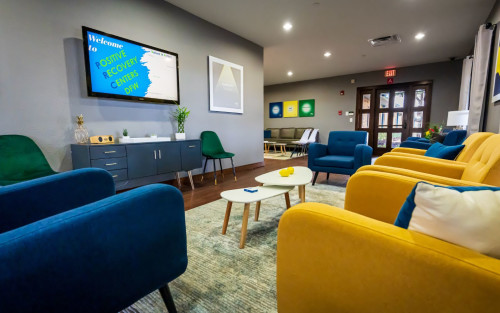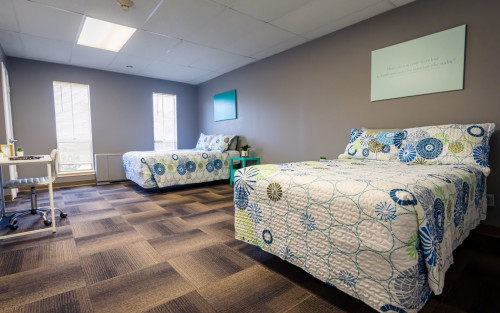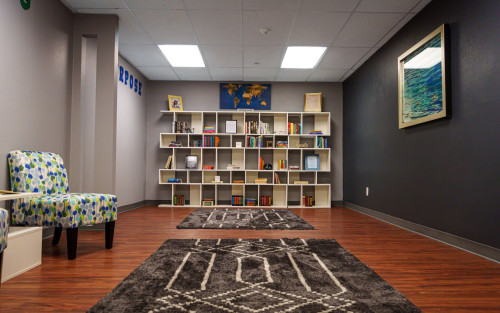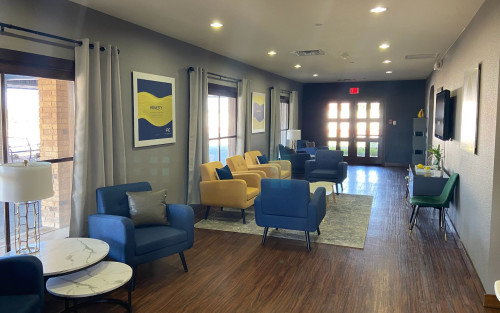






Positive Recovery Center DFW/Euless
Verified Center
This provider's information has been quality-checked by Recovery.com's Research Team for accuracy and completeness, including center verification through appropriate third-party organizations.
Treatment Focus
This center treats substance use disorders and co-occurring mental health conditions. Your treatment plan addresses each condition at once with personalized, compassionate care for comprehensive healing.
Primary Level of Care
Offering intensive care with 24/7 monitoring, residential treatment is typically 30 days and can cover multiple levels of care. Length can range from 14 to 90 days typically.
Treatment Focus
This center treats substance use disorders and co-occurring mental health conditions. Your treatment plan addresses each condition at once with personalized, compassionate care for comprehensive healing.
Primary Level of Care
Offering intensive care with 24/7 monitoring, residential treatment is typically 30 days and can cover multiple levels of care. Length can range from 14 to 90 days typically.
Provider's Policy
Positive Recovery is in-network with most commercial insurance plans. Utilizing your in-network benefits reduces your out of pocket costs. Please contact us for a free verification of benefits.
Positive Recovery Center DFW/Euless
Positive Recovery Center DFW/Euless
About Positive Recovery Center DFW/Euless
Positive Recovery Centers in Dallas/Fort Worth offers comprehensive addiction treatment focusing on both drug and alcohol recovery. They approach addiction treatment through the lens of positive psychology, helping clients cultivate positive emotions, healthy relationships, purpose and success while recovering from their addiction. Their programs provide a structured and supportive environment where clients can engage in medical detoxification, residential treatment, and, if desired, extended long-term recovery treatment through day treatment or intensive outpatient programs. The team at Positive Recovery combines medical care with therapeutic support to holistically address the physical, emotional, and psychological facets of addiction.
Medical Detox - A First Step in Treatment
The center's medical detox program allows clients to safely manage withdrawal symptoms under 24/7 medical supervision. Experienced nurses and doctors monitor clients, providing necessary treatments to alleviate discomfort and provide safety. This initial phase is crucial in preparing clients for the subsequent stages of recovery, laying a solid foundation for long-term sobriety.
Safe, Comfortable, and Substance-Free Treatment
Positive Recovery Centers' residential treatment program offers round-the-clock care, focusing on individualized treatment plans that address co-occurring psychiatric and medical needs. Clients engage in various therapies that merge positive psychology principles with evidence-based practices, emphasizing relapse prevention and recovery planning. The program includes family therapy and education, recognizing the importance of family support in recovery. Additionally, they offer Partial Hospitalization Programs (PHP) and Intensive Outpatient Programs (IOP), providing structured, flexible care for clients who need continued support while maintaining daily responsibilities.
Comfortable and Healing Atmosphere
Positive Recovery Centers in Dallas/Fort Worth offers a comfortable and supportive environment for recovery. The facility provides 24/7 medical care. With private rooms available, the center emphasizes creating a serene, homelike atmosphere conducive to healing. The structured environment includes various therapeutic settings for individual, group, and family therapy, enhancing the overall treatment experience.

Highlights from the Center
Highlights
These highlights are provided by and paid for by the center.
Customized Treatment Plans
On-site Medical Detox
Trauma-Informed Care
Center Overview
Treatment Focus
This center treats substance use disorders and co-occurring mental health conditions. Your treatment plan addresses each condition at once with personalized, compassionate care for comprehensive healing.
Joint Commission Accredited
The Joint Commission accreditation is a voluntary, objective process that evaluates and accredits healthcare organizations (like treatment centers) based on performance standards designed to improve quality and safety for patients. To be accredited means the treatment center has been found to meet the Commission's standards for quality and safety in patient care.

Insurance Accepted
Cash Pay Rates
Estimated Cash Pay Rate
Center pricing can vary based on program and length of stay. Contact the center for more information. Recovery.com strives for price transparency so you can make an informed decision.
Meet Your Care Team

Charles Fry
Executive Director
LCDC

Dr. Jason Z. Powers
Chief Medical Officer

Julie DeNofa
President

Jordan Adams
Community Liaison




Levels of Care









Your Care Options
Specializations
Alcohol
Using alcohol as a coping mechanism, or drinking excessively throughout the week, signals an alcohol use disorder.
Benzodiazepines
Benzodiazepines are prescribed to treat anxiety and sleep issues. They are highly habit forming, and their abuse can cause mood changes and poor judgement.
Cocaine
Cocaine is a stimulant with euphoric effects. Agitation, muscle ticks, psychosis, and heart issues are common symptoms of cocaine abuse.
Drug Addiction
Drug addiction is the excessive and repetitive use of substances, despite harmful consequences to a person's life, health, and relationships.
Heroin
Heroin is a highly addictive and illegal opioid. It can cause insomnia, collapsed veins, heart issues, and additional mental health issues.
Opioids
Opioids produce pain-relief and euphoria, which can lead to addiction. This class of drugs includes prescribed medication and the illegal drug heroin.
Strengths-Based
Providers using a strengths-based philosophy focus on the positive traits of their patients, creating a positive feedback loop that grows confidence.
Who We Treat
Men and Women
Men and women attend treatment for addiction in a co-ed setting, going to therapy groups together to share experiences, struggles, and successes.
Approaches
Evidence-Based
A combination of scientifically rooted therapies and treatments make up evidence-based care, defined by their measured and proven results.
Personalized Treatment
The specific needs, histories, and conditions of individual patients receive personalized, highly relevant care throughout their recovery journey.
Strengths-Based
Providers using a strengths-based philosophy focus on the positive traits of their patients, creating a positive feedback loop that grows confidence.
Twelve Step
Incorporating spirituality, community, and responsibility, 12-Step philosophies prioritize the guidance of a Higher Power and a continuation of 12-Step practices.
Therapies
1-on-1 Counseling
Patient and therapist meet 1-on-1 to work through difficult emotions and behavioral challenges in a personal, private setting.
Meditation & Mindfulness
A practiced state of mind that brings patients to the present. It allows them to become fully aware of themselves, their feelings, and the present moment.
Mindfulness Therapy
This ancient practice can be mental, emotional, and even spiritual. In meditation, you focus your attention on the present moment without judgement.
Expressive Arts
Creative processes like art, writing, or dance use inner creative desires to help boost confidence, emotional growth, and initiate change.
Family Therapy
Family therapy addresses group dynamics within a family system, with a focus on improving communication and interrupting unhealthy relationship patterns.
Life Skills
Teaching life skills like cooking, cleaning, clear communication, and even basic math provides a strong foundation for continued recovery.
Medication-Assisted Treatment
Combined with behavioral therapy, prescribed medications can enhance treatment by relieving withdrawal symptoms and focus patients on their recovery.
Conditions We Treat
Trauma
Some traumatic events are so disturbing that they cause long-term mental health problems. Those ongoing issues can also be referred to as "trauma."
Substances We Treat
Alcohol
Using alcohol as a coping mechanism, or drinking excessively throughout the week, signals an alcohol use disorder.
Benzodiazepines
Benzodiazepines are prescribed to treat anxiety and sleep issues. They are highly habit forming, and their abuse can cause mood changes and poor judgement.
Chronic Relapse
Consistent relapse occurs repeatedly, after partial recovery from addiction. This condition requires long-term treatment.
Co-Occurring Disorders
A person with multiple mental health diagnoses, such as addiction and depression, has co-occurring disorders also called dual diagnosis.
Cocaine
Cocaine is a stimulant with euphoric effects. Agitation, muscle ticks, psychosis, and heart issues are common symptoms of cocaine abuse.
Drug Addiction
Drug addiction is the excessive and repetitive use of substances, despite harmful consequences to a person's life, health, and relationships.
Ecstasy
Ecstasy is a stimulant that causes intense euphoria and heightened awareness. Abuse of this drug can trigger depression, insomnia, and memory problems.
Heroin
Heroin is a highly addictive and illegal opioid. It can cause insomnia, collapsed veins, heart issues, and additional mental health issues.
Psychedelics
Hallucinogenic drugs—like LSD—cause euphoria and increased sensory experiences. When abused, they can lead to depression and psychosis.
Languages
Aftercare
Care Designed for Your Needs
Personal Amenities
Amenities
Special Considerations
Healthy Meals are provided
Great food meets great treatment, with providers serving healthy meals to restore nutrition, wellbeing, and health.
Activities

What people are saying
Treatment
5.0
Accommodations
5.0
Food & Nutrition
5.0
Value
5.0
Pros
- Supportive Aftercare (3)
- Personalized (2)
- Friendly & Competent Staff (2)
- Confidential (2)
T.P.
Treatment in 2023 • (60 days) • Reviewed 07/29/24
Former Client
•Valet
Jonathan
Treatment in 2024 • (60 days) • Reviewed 07/20/25
Former Client
•Dallas, Texas
Tammy M
Reviewed 07/29/24
Referring Professional
•EAP/Wellness Coordinator





